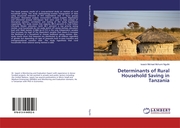Detailansicht
Determinants of Rural Household Saving in Tanzania
ISBN/EAN: 9786139949526
Umbreit-Nr.: 6084937
Sprache:
Englisch
Umfang: 212 S.
Format in cm: 1.3 x 22 x 15
Einband:
kartoniertes Buch
Erschienen am 10.12.2018
Auflage: 1/2018
- Zusatztext
- This book presents results of a cross-sectional study on motives of rural household saving. The study methodology involves triangulation of data using structured interview of 810 respondents and 11 focus groups discussion. Descriptive analysis, econometric analysis (Logistic Regression) and inferential analysis (Chi-Square Test) were used in data analysis of descriptive statistics, correlation and testing of the study hypotheses respectively. The study reveals that majority (85.4 percent) in rural follow Life-Cycle Model; education (with 66.7 percent) is top priority saving motive; rural households do not easily switch off saving motives; education level with Wald statistic (2.066) (p=0.151) is the only independent variable that increases the logit of the dependent variable that means it increases the likelihood of a household to choose livelihood saving motives. Also, study results show that bequests are distributed to all children regardless of gender but depending on type of bequests both in-vivos transfers and intergenerational transfers exist. The study hypothesis that rural households chose rational saving motives is valid.
- Autorenportrait
- Dr. Isaack is Monitoring and Evaluation Expert with experience in donor funded projects. He has worked in private and public sectors including the United Nations. Isaack has several publications in Micro Small and Medium Enterprises (MSMEs) and Monitoring and Evaluation domains. He is Tanzanian with PhD in Economics.
